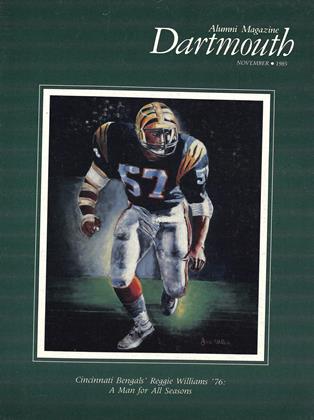WE LIVED THERE, TOO: IN THEIR OWNWORDS & PICTURES - PIONEER JEWSAND THE WESTWARD MOVEMENT OFAMERICA, 1630-1930
by Kenneth Libo '59 and Irving HoweSt. Martin's/Marek, 1984347 pp., $24.95
We are accustomed to the usual stereotypes about American Jews. The first, small wave of immigration came in colonial times, and it consisted, so the stories go, of hidalgos of Spanish-Portuguese extraction whose ships reigned over the seas, of heroic soldiers who were with George Washington at Valley Forge, and of a banker named Hayim Solomon who helped finance the Revolution. The conventional story then proceeds to the German Jews, more correctly those primarily from Central Europe, who came in the middle of the nineteenth century. Very soon, they succeeded in America by creating, or very nearly creating, a strikingly new commercial enterprise, the department store, from Filene's in Boston to Macy's in New York, and ranging farther to every major and middle-sized city in the United States. By the last decades of the century, the East Europeans began to arrive, some two million of them. They began, in the conventional account, working in sweatshops on the East Side of New York, and in comparable quarters in other big cities. Eventually, they or their children found their way into storekeeping and manufacture, especially of clothing, and soon, in very large numbers indeed, into the professions and American political life.
This account has substantial truth in it, but it is far from the whole story of American Jewry. The immigrants who came to the United States, of all the provenances, were far more rambunctious and diverse than the usual honorific and pietistic accounts would have us believe. They were, therefore, also more interesting. Kenneth Libo and Irving Howe began to retell the story of American Jewry from such a wider perspective in their first book together, TheWorld of Our Fathers, which described the life of the first generation of the East Europeans immigrants more realistically than the story had yet been told. Howe was the principal author of that volume. There is now a second book, with Dartmouth's own Kenneth Libo as the principal author, which casts its net wider, over three centuries of American Jewish experience since 1630, to describe the participation of Jews in the pioneering movement westward. The authors make the point, over and over again, through striking pictures and interesting and informed text, that there were Jews who fought duels in the early years of the republic, or who owned plantations in the South, or who fought with Mexican revolutionaries, or were sheriffs and policemen in a number of frontier towns in the Wild West. There is even more than a hint that a madam or two was to be found out in those wilds. Much closer to the center of American population, in the eastern half of the country, there were Jewish boxers and football heroes, as well as rabbis, scholars, and princes of charity.
This is an intriguing and charming book, and it makes an important point: "Jews are like everybody else, perhaps a bit more more so."
ARTHUR HERTZBERG
Arthur Hertzberg is a professor of religion at theCollege.
 View Full Issue
View Full Issue
More From This Issue
-
 Cover Story
Cover StoryA Man for All Seasons
November 1985 By Douglas McCreary Greenwood '66 -
 Feature
Feature"Shakespeare in Sable"
November 1985 By Errol Hill -
 Feature
FeaturePolitics in an electronic age
November 1985 By Jim Newton '85 -
 Article
ArticleConnie Lambert: Doyenne of "The Daily D"
November 1985 By Georgia Croft -
 Class Notes
Class Notes1978
November 1985 By Catherine A. Gates -
 Sports
SportsTough days on the gridiron
November 1985
Mark Woodward '72
-
 Books
BooksDartmouth Authors
MAY 1985 By Mark Woodward '72 -
 Books
BooksKHANS AND SHAHS: A DOCUMENTARY ANALYSIS OF THE BAKHTIYARI IN IRAN
SEPTEMBER 1985 By Mark Woodward '72 -
 Books
BooksWHAT DO UNIONS DO?
SEPTEMBER 1985 By Mark Woodward '72 -
 Books
BooksDartmouth Authors
OCTOBER 1985 By Mark Woodward '72 -
 Books
BooksTussling with Contradictions
NOVEMBER • 1985 By Mark Woodward '72 -
 Books
BooksDartmouth Authors
NOVEMBER • 1985 By Mark Woodward '72
Books
-
 Books
BooksRAYMOND OF THE TIMES
October 1951 By Arthur M. Wilson -
 Books
BooksFRANCE 1940-1942, A COLLECTION OF DOCUMENTS AND BIBLIOGRAPHY.
November 1942 By Frank Maloy Anderson -
 Books
BooksOWEN GLEN
October 1950 By Herbert F. West '22 -
 Books
BooksSCHOOLS FOR STRATEGY: EDUCATION AND RESEARCH IN NATIONAL SECURITY AFFAIRS.
JANUARY 1966 By HOWARD WRIGGINS '40 -
 Books
BooksSCENERY FOR THE THEATRE: THE ORGANIZATION, PROCESSES, MATERIALS AND TECHNIQUES USED TO SET THE STAGE.
MAY 1972 By JOHN FINCH -
 Books
BooksTHE COLONIAL CRAFTSMAN
June 1950 By Virgil Poling

